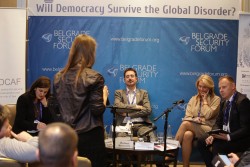NO REAL CYBER SECURITY WITHOUT COOPERATION IN THE REGION
Countries of Western Balkans are generally lagging behind in introducing and implementing national cyber security legislation and strategic frameworks, Franzika Kloper assessed in the opening of the Session Two-speed cyber security in the Western Balkans? They are more often setting up national mechanisms for response to cyber-incidents.
 The appreciation for importance of including all actors (e.g. the government, corporate, academic, and civil society sectors) in cyber security related endeavors is not yet well understood through the region.
The appreciation for importance of including all actors (e.g. the government, corporate, academic, and civil society sectors) in cyber security related endeavors is not yet well understood through the region.
Vladimir Radulović political awareness of the problem is weak, thus preventing strengthening of the institutional capacities to recognize the risks and act upon them on a national as well as a regional level, which in turn also inhibits regional cooperation. In cyber space you can’t defend alone; cooperation is much needed, especially because all regions are connected.
“We are not aware how challenging cyber security really is in our region”, Olivera Injac agreed. Western Balkans countries have all embarked on the process of rounding up their national cyber security frameworks pertaining to legal, policy and educational maters. Unfortunately, strategic efforts, political awareness and cooperation, efficient operational mechanisms, capacities, and resources to cope with the growing likelihood of a cyber attack taking place, were all often lacking.
“Although legal and strategic frameworks do exist, their implementation remains a challenge.” The main key is collaboration between countries, as well as between private companies and the government, Injac concluded.
Robert Kosla regional cooperation in cyber security in the Western Balkans is underdeveloped, non-systematic and primarily characterized by ad-hoc approach. The majority of regional organizations do not have cyber security as their primary focus. “We at Microsoft are working together with governments to improve cyber security policy in other countries”, Kosla.
Nebojša Jokić compared Serbia to other countries in the region and said it is lagging behind in terms of cyber security, but the situation is improving in contrast to the previous years.
- Robert Kosla, Lt. Col. (Ret.)‚ Microsoft CEE Area Director, Public Safety and National Security and Defence‚
- Olivera Injac‚ Assistant Professor, University of Donja Gorica, Montenegro‚
- Vladimir Radunović‚ Director of E-Diplomacy and Cybersecurity, DiploFoundation‚
- Nebojša Jokić‚ Head of the CERT Team, Ministry of Internal Affairs, Republic of Serbia‚
- Moderator: Franziska Klopfer‚ Project Coordinator, Geneva Centre for Democratic Control of the Armed Forces (DCAF).








